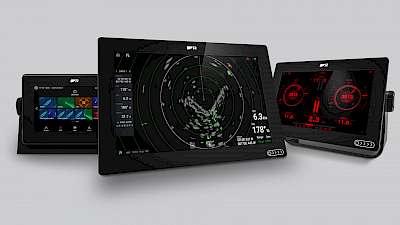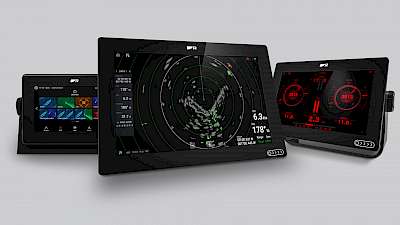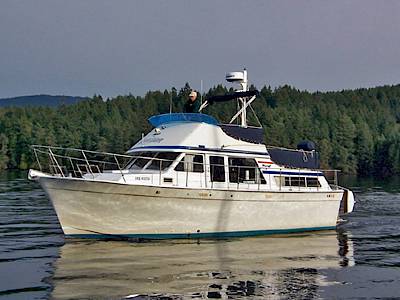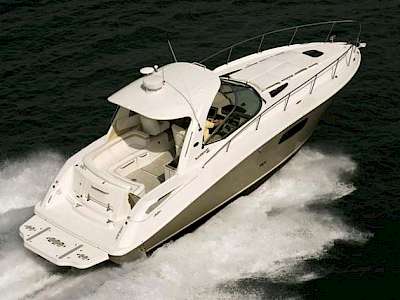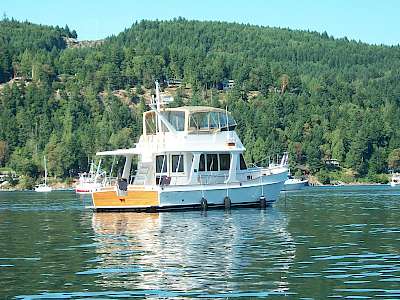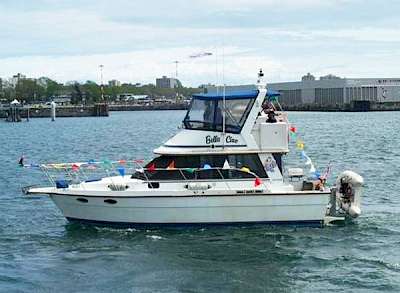Dock Talk with Jeff Cote and Ron Holland - Part 2 of 3
Transcript is auto-generated.
all right here we are well hello everyone and welcome to another uh session or insulting of uh dog talk today we have i'm very pleased to have ron allen joining us uh today to talk all things about boat and his career uh in the voting world how did you the other thing i was realizing reading your book i was like how do you have so many designs competing in one race at one time and not feel like you have favorites it's almost like their extension of yourself and i was thinking and that doesn't i mean it happened all the time so you're used to it but to someone else it seems like we'd be all in into one thing but again like elon musk you know he's got multiple uh spaceships are being built in parallel and like eventually he's learning through one away going on like you had constantly multiple votes in one race how did you how did your team you how do you not play favorites they're all your clients they're all important how do you balance all of those competing vessels trying to win the race yeah that's a great question jeff and and surprisingly that's the first time i've ever been asked this publicly and i've got a great story about it okay go ahead hit me i was wondering how do you it seems like you're all your children and how do you not love them equally that's a good this is a good one so there was a evolutionary theme going with the designs and when dave allen commissioned imp and this was with the san francisco team i'm with so these guys are not messing around they want a serious vote dave said i don't want one of those votes you're doing now i want something different i want to be able to go upwind like the boats you're doing but i also want to go downwind like improbable so i had to totally rethink and in the context of the iowa handicap measurement system so it was an attempt to make an iowa racing yacht faster downwind and you were absolutely right the the boat before imp was to a client that you've made a big effort it's the best shot i could do and this is for the southern ocean racing circuit in florida the big annual regatta so the boat that i'm that's the last one in that first evolution of boats i'm committed to sale on and then we did imp and it was rushed through the building process to be in the same regatta and exactly as you predict the owner of the volamon went why is that guy look so different than me and it's kind of hard to explain what do you tell the guy you know i've said i was saying i'm selling with you we're gonna we're gonna win races anyway that's the experiment that i'm doing because the client asks for it well so the first race we do is out of st petersburg and it's a 120 mile run and then wynwood back to the start and as we go out of tampa bay amp sails away from all the others including my latest vote and the owner looks at his iran was that go so much faster well i remember saying wait we turn the corner at the bottom mark and come back you know we're more upwind oriented they're more downwind oriented well he was kind of not very happy but accepted it and we get down to the lord mark it's dark so we can't see how far embers are here but we know she's ahead well then we come back upwind and we get daylight and we see him still pretty far ahead of us and he my client's going hey you remember what you said about going out when faster how we're going to catch these guys well imp sailed away upwind so they were faster down when to end up win and i went to go go well my client was not very happy with me yeah why because i'm thrilled to see him doing so well but i got to pretend i'm upset the the one thing if looking at all your designs and your clients i was trying to balance how much were you dreaming and having your clients fulfill your dreams of innovation on design versus having your clients influence the design it seems to be obviously a part of each depending on the owners some of them seem to be really involved in in pushing the boundaries or stipulating certain requirements like i think it was one of the boats it was four man crew only uh you know all the winches had to be hydraulic so you're being constrained by the owners and putting these incredible bars but how much of that was pushed by them versus you wanting to also push the envelope and having them endorse your drive to keep making things different better okay with the race boats the owners are just going to trust you that we're going to come up with something better with the bigger the the design my design business changed and the boats got bigger and more complex but they weren't racing boats the owners of those boats were very influential the owners of the racing arch kind of gave us a free hand and and emp was so good because dave allen gave us a free hand [Music] in an aggressive way he instructed me i don't want one of those votes you're doing for everyone else i want something different so he gave a freedom that the other guys in this time period wouldn't you because they want both to just be the last boat you did they've wanted something that were totally different yeah that's that's interesting the the the envelope being pushed now obviously naturally you're not gonna always make the next racehorse you're gonna in those you're gonna have some that are gonna win some that aren't gonna win there's all these challenges on production that's that's an interesting uh in situation to be in especially to build those boats and then have those owners come on board and see okay what are we gonna what dreams are we gonna make possible here because certainly some of those races i mean they were not winning every race but they were up there in the contention like they were they were competitive enough that the owners were excited about what they had done it sounds like reading the book yeah and we we did lots of boats this was a very interesting period in the uh international yacht racing so this is 1980 79 80. um yeah 79 was the rough fasted race chapters by the way so in 78 this is a good story from a general view of the subject we're covering admiral's cup was the world championship of iowa racing arts and most of my design effort was focused on this area in 1978 there were over a hundred new yachts building around the world trying to qualify for the three boat team in their country to come to the emerald cup the over 100 boats were designed by three designers imagine a hundred boats a year one year building to target this race and it was approximately like doug peterson had the opportunity to do 40 votes i had the opportunity to do 30 and him and freya had the opportunity to do 25 or 30. i mean that never happened before and it's never happened since that you're going to get a chance a hundred chances to do new boats for for a particular regatta but that was so that's the height i st i did by quarter tanner and won the quarter time cup in 1973. and in 1979 there was that that period was this racing period and then the world got richer and the guys that had the little race boats wanted more comfort and they can afford it so in in the 19 early 1980s the votes started getting bigger and i'm selling the performance of my race boats with the desired comfort where did you find your i want to talk later about um how influential obviously it sounds like it's almost a bi like you were helping your clients but it also sounds like as you got to know your clients they were helping too it sounds like you were inspired by them on different levels they seem to have made an impact on you but in light of that context of dealing with all these people that are successful in their own right pushing the boundaries they're competitive they're willing to take chances where did you find the creative juices you know it's almost like to me it's almost like imagine being a singer songwriter where did you find when you talk about music a lot in your book um and how you remember one of your stories uh was losing your lp connection like how important that was and i think where did you find that moment to slow down and dream different like how did you put yourself in the mind space to break your own boundaries how did what was that like was it like walking like at night where do those inspiration those ideas sort of come to you how did you make them because you had you were constantly being pushed to make things better yeah i mean the the clients are hugely influential even if they don't realize it because my goal i'm not selling a kind of ron holland philosophy i believe i'm selling i'm listing to the client and i'm trying to give him what he's describing even he's not describing it very well so the clone the whole yacht design thing following the racing boats was all about client influence um with the race pace it was too technical if you like for the client to really understand except sweeping statements like dave ellen give me something different so brush strokes and and so around the table i mean i guess you're you're just brainstorming you're just pushing the boundaries where you didn't think you i guess you're constantly it sounds like you're constantly learning and not too scared of failing because you do talk about in your book about you know like mr tanaka um you know all on the production side i mean again the the builder there the mask but that was still even if it's not your fault you're still going through and you're learning about the you know spars or the rudder you're as you push the boundary you've got to deal with failure so how is that for you dealing failure and learning from it you didn't seem like it it didn't stop you from still trying like you always got back and kept going how did you deal with failure public because your designs are out there in race environments pushing the boundaries that to me was also another lesson is that you seem to be willing to take chances and learn from them yeah and then the biggest example i think was in 1979 an older carpet father rudd is breaking oh yeah during the fastnet race you're talking about so before like i did a boat for the prime minister of england morning cloud that he should have been in the british admiral's cup team but the rudder broke in one of the preliminary races so hey you know it's pretty high profile you've got edward he's not in the trials for the emeralds cup because ron holland's carbon fiber rudder broke oh you can't have much higher profile than that you have a bit higher profile like cyber le bonds drum kill falling off that was pretty high profile so now the greater the carbon fiber multiple failure could have been the end of my racing career but my clients were sympathetic with me pushing the boundaries so they were kind of a little bit responsible too you know they kind of was saying we're going to do a new race vote what do you need you need carbon fiber you know 15 of the weight of steel and fiberglass rudder so none of them now a couple of them didn't come back to me for their next race boat but most did come back because they understood like you're suggesting we're pushing the boundaries and we there are risks it you must have i mean internally process what happened but you probably didn't dwell too much on it beyond the lessons learned i mean otherwise you would just you can open your own sort of sadness and go well it happened it happened sounds like you would learn from it and then move on you didn't it didn't stop you from pushing the boundaries it sounds like no but we you know we fixed it everyone in the industry learned how to do both race boats with carbon fiber rudders and it's normal now yeah so so long as it's a bit like the music business you know you if you it's a you if you're not the top 10 for for long enough you're out of the business so the race when i consciously decided to follow these big boats and leave the racing field there was a bit of relief actually too because the pressure of needing to win the next race was i live with it in the production side too i mean it's not just the design it's in the production and then the logistics it sounds like for yacht delivery you know like it's it's layers upon layers it's even if you had 10 years it would be too much but then you had to do it all in a short timeline crazy production crazy logistics to make the race like all these owners don't settle like you say i mean they're driven they they don't take no or they're they're good at maybe motivating others to achieve things that otherwise would seem impossible is the way that i was reading a lot of the chapters like like you've got all these challenges on top of it's just even the delivery of the boats was crazy getting the boats to the races getting them prepared uh getting them ready no real shakedown cruises or the first shakedown probes is a race if you've triggered something new in the way i would present this um this is not something i have on my agenda for talks what you just described uh years later i had a stroke so uh i'm now i would have said before i had the stroke i would have said well hey tell us about your logo well i'm doing doing boats you know it's an easy life after the stroke i look back and i go bloody hell that was pressure describing but see i would i would never have predicted this is so tough a job i could have a stroke never gave it a second thought but when i reflect on it you know one of the most difficult things was the travel we traveled every week because it was that kind of relationship with the builder the owner hey it's been the last couple years been pretty interesting no travel and we're surviving but but your view of the complexity of this period is valid we will really pushing the limit of my health and everyone i think i mean it sounded like everyone was going above board you remember when that uh the rudder broke and then it was built overnight you know they sailed i can't remember they took a plane to was it jamaica i can't remember what the island was gave them the rudder they kept going and you're like this is all happening i mean it just seems like everyone is it's it's almost like not war but it's high alert it's like you need to respond not in dates but sometimes in hours and minutes there's a there's a huge time crunch to all of this to meet the timelines or the schedules of the races which adds a whole other level of stress to what everyone was doing that seemed pretty hard i can see how that would take a dole on everyone let's talk about on a lighter side it sounds like your passion and you have you talk about this also in the book on flying and it's amazing how many airline pilots uh we get to meet that are voters there's a lot of there's obviously a lot of parallels between flying you know um and the trills that come from flying the navigation challenges uh just trust in your systems there's a lot of parallels and then you got into flying too it sounds like in a big way um how important was flying in your career as contrast to racing or boating um it's not such an influence so for instance if you were a yachties owner not an enthusiast about flying you can still design good boats but it's something that i like the voyaging aspect of flying you know it's like getting from a to b how to do that it's a bit like executive yacht across the ocean yeah so that must be very enjoyable and i've been lucky because many of my clients have aeroplanes and so i've been exposed to it more than most people would be yeah some interesting airplanes too um the when you were uh so you were flying mainly as a means to stay in touch with all your clients everywhere it sounds like and i guess you were lucky to be based in europe um and what and there was a big change when cheap flights became an influence on the whole airline industry so prior to that you could kind of justify airplane influence but when they when ryanair came on the european scene and you get to spain for ten dollars or something well that was the end of justifying flying with a business context
UnBoxing & Product Reviews
Raymarine Axiom 9+RV Multifunction Display - UnBoxing and Product Review
Boating Tech Talk
Dock Talk with Jeff Cote
Boating Tech Talk








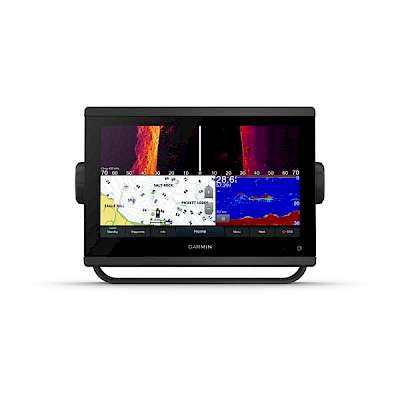
 $2,159.99
$2,159.99 $1,518.07
$1,518.07
